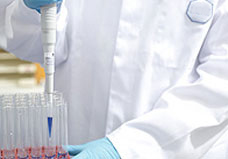| |
 |
|
|
|
|
|
|
Rectal prolapse |
|
|
What is rectal prolapse?
Rectal prolapse occurs when part or all of the wall
of the rectum slides out of place, sometimes sticking out of the
anus. See an illustration of rectal prolapse.
There are three types of rectal prolapse:
-
Partial prolapse (also called
mucosal prolapse). The lining (mucous membrane) of the rectum
slides out of place and usually sticks out of the anus when you
strain to have a bowel movement. The condition may be confused
with internal hemorrhoids. (See an illustration of a
hemorrhoid.) Partial prolapse is most common in children younger
than 2 years.
-
Complete prolapse. The entire
wall of the rectum slides out of place and usually sticks out of
the anus. At first, this may occur only during bowel movements.
Eventually, it may occur when you stand or walk, and in some
cases the prolapsed tissue may remain outside your body all the
time.
-
Internal prolapse (intussusception).
One part of the wall of the large intestine (colon) or rectum
may slide into or over another part, like the folding parts of a
telescope. The rectum does not stick out of the anus. (See an
illustration of intussusception.) Intussusception is most common
in children and rarely affects adults. In children, the cause is
usually not known. In adults, it is usually related to another
intestinal problem, such as a growth of tissue in the wall of
the intestines (such as a polyp or tumor).
In severe cases of rectal
prolapse, a section of the large intestine drops from its normal
position as the tissues that hold it in place stretch. Typically
there is a sharp bend where the rectum begins. With rectal
prolapse, this bend and other curves in the rectum may straighten,
making it difficult to keep stool from leaking out (fecal
incontinence).
What causes rectal prolapse?
Many conditions increase the chance of developing
rectal prolapse. Risk factors for children include:
- Cystic fibrosis. A child who has rectal
prolapse with no obvious cause may need to be tested for cystic
fibrosis.
- Having had surgery on the anus as an infant.
- Malnutrition.
- Deformities or physical development problems.
- Straining during bowel movements.
- Infections.
Risk factors for adults include:
- Straining during bowel movements because of
constipation.
- Tissue damage caused by surgery or
childbirth.
- Structural conditions present since birth.
- Weakness of pelvic floor muscles that occurs
naturally with age.
What
are the symptoms?
The first symptoms of rectal prolapse may be:
- Leakage of stool from the anus (fecal
incontinence).
- Leakage of mucus or blood from the anus (wet
anus).
Other symptoms of rectal
prolapse include:
- A feeling of having full bowels and an urgent
need to have a bowel movement.
- Passage of many very small stools.
- The feeling of not being able to empty the
bowels completely.
- Anal pain, itching, irritation, and bleeding.
- Bright red tissue that sticks out of the
anus.
How is
it treated?
Prolapse in children tends to go away on its own.
In adults, eating plenty of foods that contain fiber may improve
mucosal prolapse caused by constipation and straining. However,
surgery is usually needed if you have a complete prolapse or a
mucosal prolapse that does not improve with a change in diet.
Surgery involves attaching the rectum to the muscles of the pelvic
floor or the lower end of the spine (sacrum) or removing a section
of the large intestine that is no longer supported by the
surrounding tissue. Both procedures may be done in the same
surgery.
Treatment of children with rectal
prolapse
In children, rectal prolapse usually goes away on its own. A
parent or other caregiver often can manage the rectal prolapse
with home care methods until it heals. If your child has a rectal
prolapse, you can help prevent the prolapse from coming back by:
-
Pushing the prolapse back into
place as soon as it occurs. Wear disposable latex gloves and use
lubricating jelly. Applying an ice pack can help decrease
swelling.
-
Having the child use a small
toilet that is placed on the floor. This will help support the
child's buttocks so that he or she will not have to strain while
having a bowel movement.
Most children who develop rectal
prolapse between the ages of 9 months and 3 years will respond to
home treatment. In these cases, prolapse usually does not continue
after age 6.
If a medical condition, such as cystic fibrosis, is causing rectal
prolapse, it will usually need to be treated to resolve the
prolapse.
If rectal prolapse is not caused by another condition or does not
respond to home treatment, your child may need other treatment.
Injecting a chemical called a sclerosant into the wall of the
rectum can be very effective at treating rectal prolapse in
children who do not improve after home treatment.
|
|
|
|
Rectal prolapse - treatment of Rectal prolapse,
Rectal prolapse types, Disease medicines, Rectal prolapse symptoms, Rectal
prolapse and Disease symptoms, Rectal prolapse symptoms Disease and
diagnosis, Symptoms and Solutions, Signs and Symptoms, type of Rectal
prolapse, cause common, common Rectal prolapse, Rectal prolapse List, causes
list, Infectious Rectal prolapse, Causes, Diseases , Types, Prevention,
Treatment and Facts, Rectal prolapse information, Rectal prolapse:
Definition, Rectal prolapse names, medical Rectal prolapse, medical Rectal
prolapse and disorders, cell Rectal prolapse, Rectal prolapse Worldwide,
Rectal prolapse Research, Rectal prolapse Control, Rectal prolapse Center,
Digestive Rectal prolapse Week, Information about Rectal prolapse, causes of
different Rectal prolapse, Rectal prolapse Articles, Rectal prolapse and
conditions, Health and Rectal prolapse, Rectal prolapse Patients, Rectal
prolapse and Sciences, causes of alzheimer's Rectal prolapse, Rectal
prolapse causes, alternative medicine heart Rectal prolapse, body ailments,
Rectal prolapse medicines, medical antiques, type of blood Rectal prolapse |
|
|





